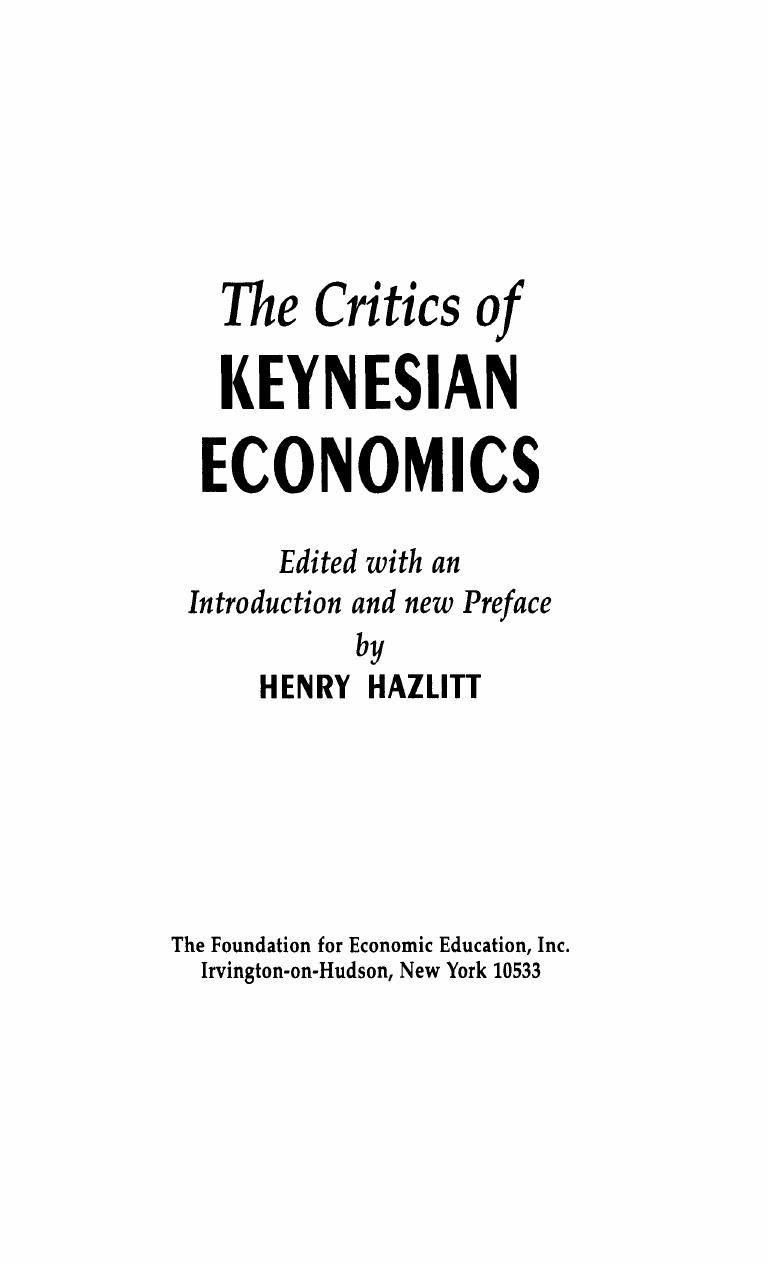The Critics of Keynesian Economics by Henry Hazlitt

Author:Henry Hazlitt [Hazlitt, Henry]
Language: eng
Format: epub, pdf
ISBN: 978-1-6101-6136-7
Publisher: The Foundation for Economic Education, Inc
Published: 2011-11-06T16:00:00+00:00
THE PHILOSOPHY OF LORD KEYNES
PHILIP CORTNEY
It is essential to study the philosophy of Lord Keynes if we want to explain and understand his attitude toward gold. It is not the presupposed tyranny exercised by gold on men and economy which has led him to espouse his philosophy, but it is this last which determined his attitude regarding gold.
First of all, what does Lord Keynes think about human nature? The answer to this question seems of primary importance for it is impossible without it to have a workable political philosophy and also because economic phenomena are determined, to a large extent, by psychological factors. Men seem to him to have natural inclinations toward cruelty as well as a desire for personal power. Lord Keynes also admits that man has a passion for money. He even feels that it is better for humanity that man’s desire for power be directed towards increasing his bank account. Lord Keynes does not believe that we can change human nature, but he is of the opinion that we can “direct” it. (I am indeed very much afraid that if we push too far our control of money and economy, we will be obliged to direct human nature . . . with the help of a knout.) For what purpose should we educate human nature? The ruling class, answers Lord Keynes, should be trained to be satisfied with smaller returns than in the past in order to allow a more equitable distribution of revenue.
To the question of whether what Lord Keynes calls an equitable distribution of revenue is not going to decrease savings, he answers with satisfaction in the affirmative, since for him there is not only too much saving, but this latter is practically a sin. Too much saving and not enough consumption and investments, these are the source of all our evils, according to the diagnosis of Lord Keynes. He maintains that the needs for capital are too moderate and that interest rates on savings should tend toward zero. He is in favor of “the euthanasia of the rentier” and he predicts their eventual disappearance . . . when they will have finished their job (?). On the other hand, only last September, the “Economist” published a series of articles asserting that the increase of productivity of English industry—without which increase England is facing serious dangers—depends on savings, and, furthermore, that the investment of these savings will be governed by the possibility of realizing profits in proportion to the risks involved. Lord Keynes is fighting against savings maintained in the form of money and bank deposits. He has even declared himself in favor of “melting money” as recommended by a German, Silvio Gesell. This consists of a penalty on money not used which should be proportionate to the time it has not been utilized. One may recall that in France a former Prime Minister endorsed, in 1935, “melting money” as a remedy for the depression from which she was then suffering. But, may I ask,
Download
The Critics of Keynesian Economics by Henry Hazlitt.epub
The Critics of Keynesian Economics by Henry Hazlitt.pdf
This site does not store any files on its server. We only index and link to content provided by other sites. Please contact the content providers to delete copyright contents if any and email us, we'll remove relevant links or contents immediately.
International Integration of the Brazilian Economy by Elias C. Grivoyannis(111059)
The Radium Girls by Kate Moore(12028)
Turbulence by E. J. Noyes(8049)
Nudge - Improving Decisions about Health, Wealth, and Happiness by Thaler Sunstein(7706)
The Black Swan by Nassim Nicholas Taleb(7129)
Rich Dad Poor Dad by Robert T. Kiyosaki(6632)
Pioneering Portfolio Management by David F. Swensen(6300)
Man-made Catastrophes and Risk Information Concealment by Dmitry Chernov & Didier Sornette(6019)
Zero to One by Peter Thiel(5801)
Secrecy World by Jake Bernstein(4753)
Millionaire: The Philanderer, Gambler, and Duelist Who Invented Modern Finance by Janet Gleeson(4478)
The Age of Surveillance Capitalism by Shoshana Zuboff(4292)
Skin in the Game by Nassim Nicholas Taleb(4248)
The Money Culture by Michael Lewis(4207)
Bullshit Jobs by David Graeber(4190)
Skin in the Game: Hidden Asymmetries in Daily Life by Nassim Nicholas Taleb(4006)
The Dhandho Investor by Mohnish Pabrai(3764)
The Wisdom of Finance by Mihir Desai(3746)
Blockchain Basics by Daniel Drescher(3582)
